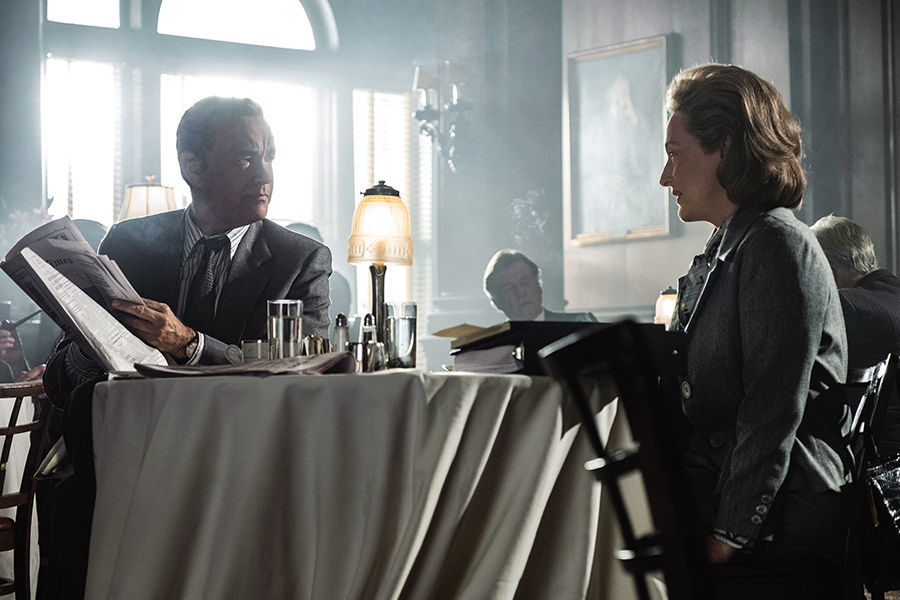History, as we’re all acutely aware, has a frustrating way of repeating itself. But thankfully, truly great movies have an equally reliable ability to hold the magnifying glass up to history when we need it the most.
“The Post” (Rated PG-13), the latest from iconic director Steven Spielberg, is one of those films ... but it takes a while for that to become clear. Reminiscent of the New England Patriots’ performance in last year’s unforgettable Super Bowl, “The Post” puts forth an alarmingly sluggish first half that initially appears to be insurmountable until it responds with virtually flawless execution in its second half to secure the unlikeliest of comeback triumphs.
It’s a dramatic (well, eventually) retelling of The Washington Post’s monumental publishing of the Pentagon Papers, classified documents exposing President Richard Nixon and his predecessors for deceitful cover-ups pertaining to the U.S.’ involvement in the Vietnam War.
“The Post” focuses on the newspaper’s editor in chief Ben Bradlee (Tom Hanks), the man who spearheaded the initiative to publish the Pentagon Papers, and its owner Katharine Graham (Meryl Streep), the woman who bravely signed off on it.

Bradlee and his scoop-thirsty staff are tired of constantly being a step behind their rival, The New York Times, in breaking major news stories. When a shocking Times series detailing the government’s long-running deception of the American public gets pulled as a result of a court injunction, Bradlee and his staunch assistant editor Ben Bagdikian (Bob Odenkirk) pounce on the opportunity to track down the source who originally leaked the story to The Times and expound upon it in The Post.
But for Graham, the de facto owner of The Post in the wake of her husband’s suicide, publishing isn’t a simple black-and-white issue. Graham feels immense pressure not only in her current efforts to take the family-run Post public, but also by virtue of being a woman whose exclusively male board of advisers openly doubt her leadership capabilities due to her gender.
The heat on Graham intensifies when The Post’s legal team expresses legitimate concerns that Graham’s approval of publishing the Pentagon Papers could be an indictable offense.
In this, the 34th feature film with Spielberg at the helm, the seasoned director has enlisted an equally decorated duo of leads in Streep (who seems destined for her ongoing record 21st Oscar nomination) and frequent collaborator Hanks (who could very well get his sixth despite never totally nailing Bradlee’s Boston accent). The dynamic Streep and Hanks both disappear into their respective roles, and watching the two screen legends play off of each other is a true delight.
Streep and Hanks will undoubtedly be the ones to earn the accolades and recognition for shouldering the bulk of the work, but the ensemble from top to bottom submits performances that are equally praiseworthy.

Spielberg has assembled a recognizable name/face for just about every single role in the film (Sarah Paulson, Bruce Greenwood, Bradley Whitford, Jesse Plemons and Alison Brie, just to scratch the surface of the list), and he gets what he pays for: one of the finest ensembles you’ll see this year.
The tremendous performances and other undeniable inherent strengths of the film, however, aren’t enough to sustain the drama during a first act so bogged down by stagnant pacing and so riddled with tropes characteristic of films about the press that your mind can’t help but to entertain phrases like “old hat” and “Oscar bait,” and to wonder if The Post’s ad nauseum hunt for the Pentagon Papers will ever end.
Once The Post finally secures the sought-after documents and sets the stage for the second act, however, the narrative stomps on the gas and never looks back. Beginning with a breathtaking scene in which Streep’s Graham confronts dear friend Secretary of Defense Robert McNamara (Bruce Greenwood) for standing idly by while young men like Graham’s son were sent aimlessly off to Vietnam, “The Post” showcases Spielberg at his signature best.
A close-up of a rattling lightbulb below The Washington Post printing press in the process of publishing news that will forever raise the standard by which the press reports even the ugliest of facts, serves as a subtle yet unforgettable image, one of many moments in which Spielberg displays his unparalleled creative touch.
The gripping, Oscar-caliber second and third act not only capture the true events in exhilarating fashion, but also explore a myriad of timely themes that ring painfully true.
“The Post’s” depiction of not only the press’ dilemma in printing truths that would expose and potentially ruin the world’s most powerful leaders, but also Graham’s struggle to assert herself as a leader in a male-dominated environment is so cuttingly relevant, you almost expect to hear Nixon utter the phrase “fake news” or hear a female character declare “time’s up.”
In a contentious Trump America that has witnessed a dearth of ethical leadership and prompted a cascade of disturbing “#MeToo” rallying cries, “The Post” arrives on America’s doorstep at just the right time — if, of course, you’re willing to give it time.
Interested in more? Subscribe to Angelus News to get daily articles sent to your inbox.

